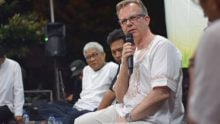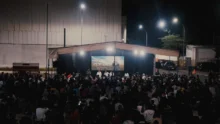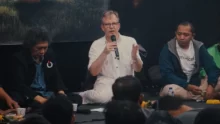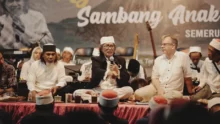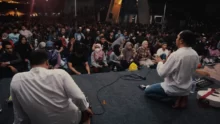Maiyah and Capital
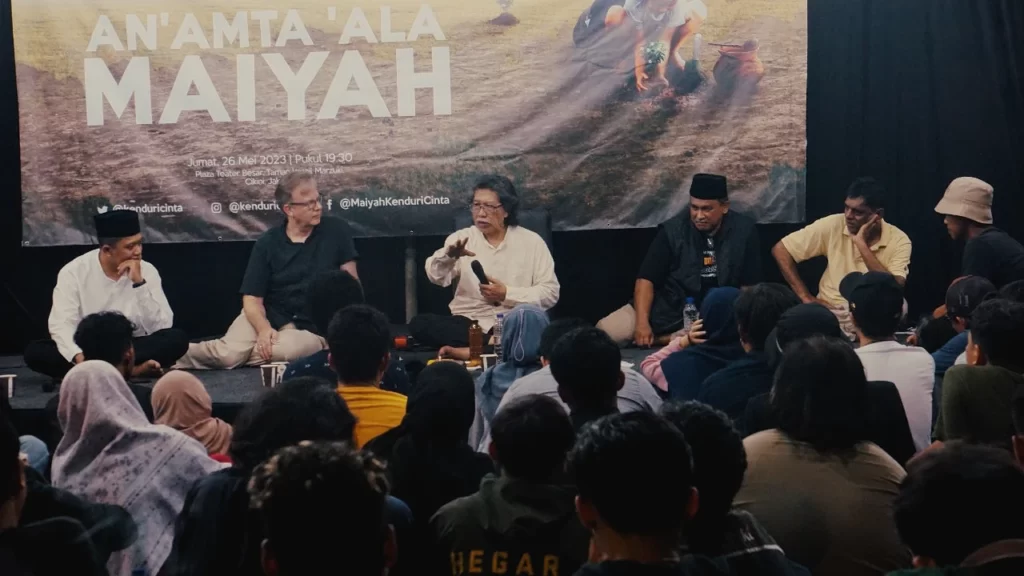
Kenduri Cinta on 26 May 2023 was always going to be an important one. Saturday 27 May would mark Mbah Nun’s 70th birthday so it was only fitting that it be celebrated by all those who attended Kenduri Cinta at Taman Ismail Marzuki. For me, this was
a special day. I first met Mbah Nun 25 years earlier on this day, his 45th birthday, and it led me to all I’ve done with the Maiyah movement ever since. Perhaps you have your own stories about first meeting Mbah Nun, or joining a Maiyah event. Write about it here. We’d like to hear it. My own story can be found in other pieces posted here or in the book “Jalan Sunyi Emha”.
For me again, there were four things to note and talk about this evening. They concerned management and leadership as widely practiced today, Maiyah as a counter-culture “alternative” to that, Mbah Nun’s own work, path and journey, and how we can better emulate and live by Maiyah values.
The first point was to identify the key factors that make up modern management culture in business and leadership. The most obvious that comes to mind is capital. Capital is important in the context and monetary value upon which all business is based. “Capital” is also used to describe assets and resources. It’s not unusual for people, employees and staff, to be described in the worlds of business and management as “human resources” or even “human capital”, as if human beings. And be reduced to the impersonal level of “assets” and to be valued in the same way.
Business and its success is defined and measured by another set of values besides capital, recourses and assets. One key measure of success is “productivity” — how much “value” can be extracted from those resources in terms of their work and what they produce. Other values include “growth”, “profit and loss” and all the impacts that stem from them. These are how work is assessed and evaluate when we are employed with a modem management or business setting.
This brings us to the second point. The values that we see being raised up and lived within the Maiyah movement. Maiyah offers an alternative to the measures used to describe business and management. The “capital” different. The assets and resources are different and the outcomes and profit are different. And in Maiyah there can be no “loss” – on shrinkage, contraction or reduction – only human, personal and spiritual growth. These are its values.
In terms of “productivity” let’s review the output of Mbah Nun. Records tell us that this includes 18 books of poetry. What was the first one you read? Was it 99 Untuk Tuhanku or perhaps Cahaya diatas Cahaya? These were among student favourites in the early ‘90s. There were also 18 dramatic works and 51 books of collected essays. These last two categories, along with the poetry, have been among the most influential in a literary sense. In the field of music there were eight works of musical poetry and at least 18 albums with KiaiKanjeng, not to mention the overseas tours and countless appearances across Indonesia, at least eight per month for a period of 22 years. Add to this hundreds of newspaper articles, transcripts and quotes and an award-winning film scenario.
These works, tours, and bouts of activism cannot be compared with terms such as capitol, profit and loss. Humanitarian, social and spiritual values are worth so much more. People are values in and of themselves, not “resources” to be measured.
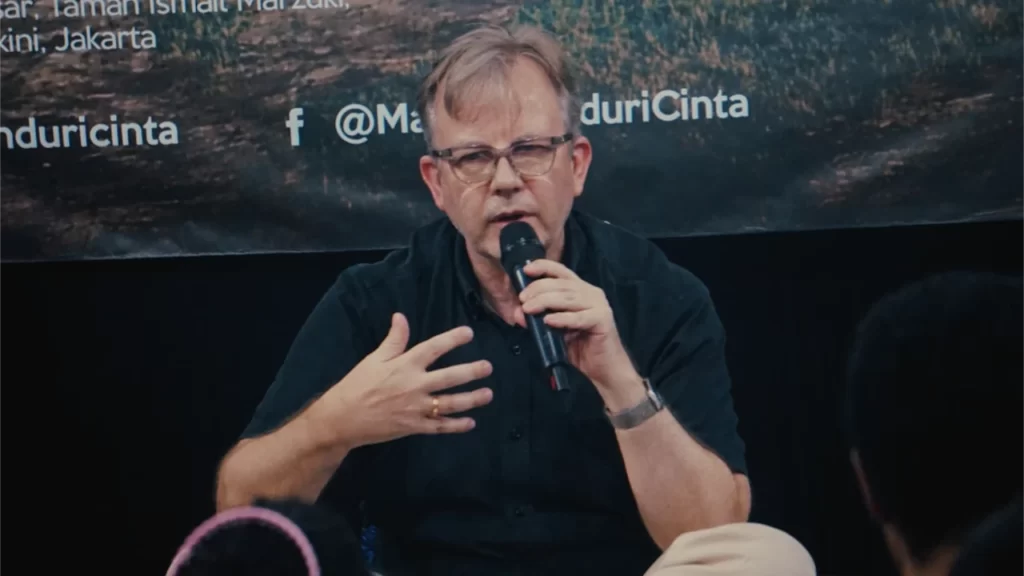
Thirdly, in recognizing and celebrating Mbah Nun’s 70th birthday, we can reflect on the journey of his life through a disjointed and incomplete education, punctuated by early departures and moves, through his early emergence as an artist and writer on Malioboro under the influence of the poet Umbu Landu Paranggi, on to literary residences in the Netherlands and the USA, political opposition in Indonesia during the latter years of the New Order and finally the pivotal events of 1998, culminating in the a abdication of President Suharto in May of that year.
The atmosphere of doubt and recrimination that followed that period led directly to the birth of Maiyah with Padhangmbulan initially and then Kenduri Cinta in June 2000, 23 years ago. Those events and Mbah Nun’s role in them will not be found in academic journals or history books – that is a “silent” role – but they are recorded on the Kenduri Cinta website and will not be lost to the future.
Mas Tri, Mas Fahmi and Mas Ali all made contributions to the evening’s narrative, and there was music from the guest band. All of the points made above only serve to accentuate how we should incorporate these values and high productivity in our own lives. When Mbah Nun took to the stage, he invited volunteers from among the jamaah to highlight what they saw as the key “values” of Maiyah. Five or six responded with terms such as damai – peace, aman – safe, murni – pure, gembira – joyful, rindu – longing or yearning, and sinau bareng – learning together.
Mbah Nun then turned the discourse around, asking the jamaah to take these adjectives and turn them into verbs – actions that we could take away and perform. To secure and make safe, to purify, to teach, to bring about joy and happiness. It all made sense. Finally he returned to the earlier discussion about capital and said that it could be a force for good if used in the right way, and not for narrow and exploitative gain.
There was more and I may write about it again, but for now these points serve to lay the grounds for celebrating Mbah Nun’s 70th birthday and wishing him many more years of “productivity”, health and happiness to come.
Tangerang, 4 June 2023
Ian L Betts

